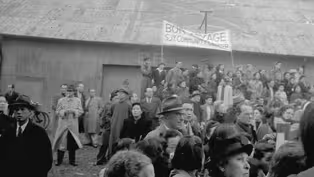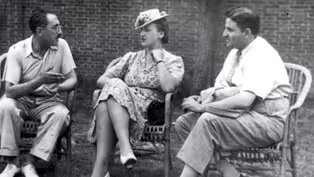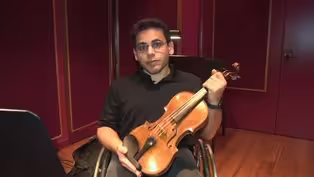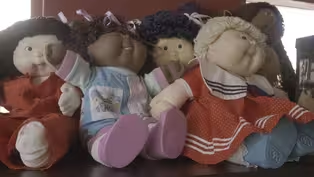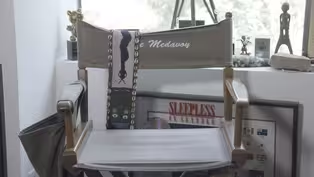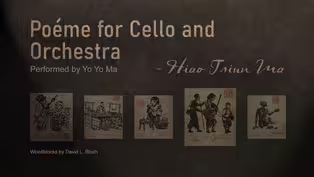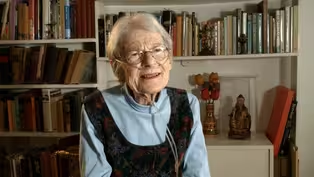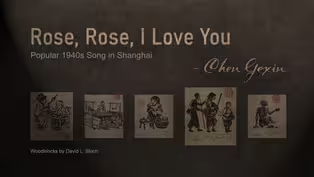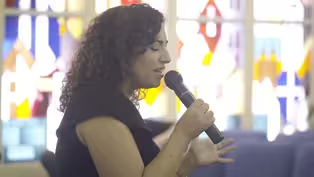
Harbor from the Holocaust
Episode 1 | 56m 5sVideo has Closed Captions
Hear the story of nearly 20,000 Jewish refugees who fled Nazi-occupied Europe to Shanghai.
Harbor from the Holocaust is the story of nearly 20,000 Jewish refugees fleeing Nazi-occupied Europe during World War II, to the Chinese port city of Shanghai. Explore the extraordinary relationship of these Jews and their adopted city of Shanghai, even through the bitter years of Japanese occupation 1937-1945 and the Chinese civil war that followed.
Problems playing video? | Closed Captioning Feedback
Problems playing video? | Closed Captioning Feedback

Harbor from the Holocaust
Episode 1 | 56m 5sVideo has Closed Captions
Harbor from the Holocaust is the story of nearly 20,000 Jewish refugees fleeing Nazi-occupied Europe during World War II, to the Chinese port city of Shanghai. Explore the extraordinary relationship of these Jews and their adopted city of Shanghai, even through the bitter years of Japanese occupation 1937-1945 and the Chinese civil war that followed.
Problems playing video? | Closed Captioning Feedback
How to Watch Harbor from the Holocaust
Harbor from the Holocaust is available to stream on pbs.org and the free PBS App, available on iPhone, Apple TV, Android TV, Android smartphones, Amazon Fire TV, Amazon Fire Tablet, Roku, Samsung Smart TV, and Vizio.
Buy Now
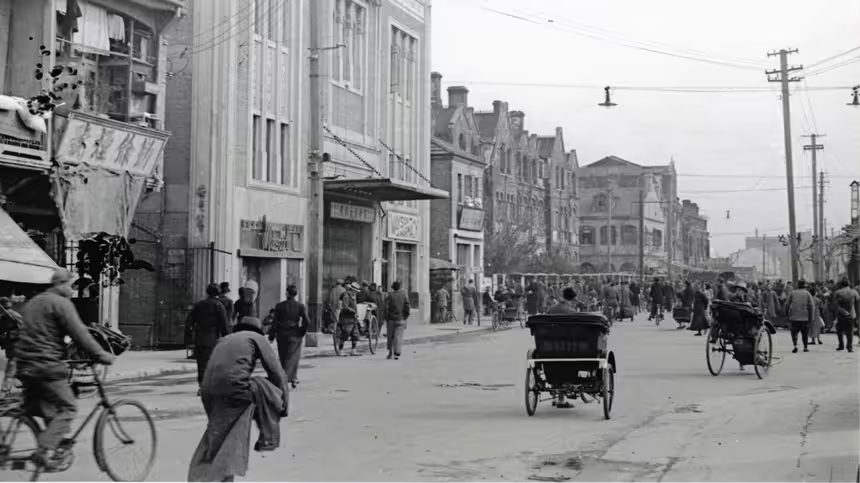
Harbor from the Holocaust
For prompts and tips on facilitating conversation around the film, get a closer look at the Harbor from the Holocaust discussion guide.Providing Support for PBS.org
Learn Moreabout PBS online sponsorship[ Birds calling ] ♪♪ Woman: It was a strange atmosphere.
When you're on a boat, that sort of feels like vacation.
But on the other hand, you were really sailing into a black hole.
You didn't know what in God's name awaits you there.
I wondered, would any of us ever be alright again?
♪♪ ♪♪ ♪♪ Bar-Gal: I took myself the same tour I will deliver to you this morning, and I find the whole story fascinating because we do not get to learn at all about the Jews from the Far East, the Jews from China.
Everything that I will tell you in the next 4 hours, completely new to me when I arrive Shanghai.
There was no other city in the world that during the Holocaust, getting to save so many Jewish lives like Shanghai did.
Most of them lived right in this neighborhood here, and my question to you will be, "Pourquoi Shanghai?"
You live in Germany, you live in Austria, you live in Poland -- why are you coming to here?
♪♪ ♪♪ ♪♪ Sasson: I was born in Vienna, Austria.
It was 1938.
My parents, prior to that, had a very comfortable life in Vienna, and I used to hear stories about the music and the pastries and the chocolates and going to the mountains on weekends.
Marcus: I was a skier and I was an ice skater.
I was in Vienna from 1 to about 11 years, and it was the perfect life.
Silberberg: My dad owned a furniture store in Berlin.
It was a large family.
My father was one of nine.
The family was close.
We kids played, and it was just like a regular childhood.
There was absolutely nothing to warn of what was going to happen.
♪♪ [ Car horn honks ] Hirsch: The Jews were very proud to be German.
At first, there were people, including my father, who thought that, well, you know, "I fought in World War I.
Surely, they will leave me alone."
Well, [chuckles] that -- that... that did not happen.
[ Soldiers chanting ] Tobias: There was a period beginning when I was about 4, when I felt in relatively constant danger growing up in Berlin.
And then the worst period was Kristallnacht.
Silberberg: Which is known as Night of the Broken Glass.
And that's when everybody started saying, "Oh, this is getting bad."
Blumenthal: My mother had a store, and the store was wrecked and taken away from her.
Most of the Jewish men between the ages of 18 and 60 that the Nazis could find that night were arrested -- my father was arrested -- were taken to concentration camps.
Tobias: The next morning, after Kristallnacht was over, in the center of the courtyard of our synagogue was a mountain of simmering ashes.
And in the center of the mound, I could see the handles of the Holy Torah scrolls.
And that was perhaps the most frightening moment of all.
I suddenly realized that there was no safety for us anywhere.
[ All chanting ] ♪♪ Marcus: Many people were giving up.
There were suicides, people were leaving.
We were in terror.
My aunt and uncle knew that the time had come -- we get out now, or we don't get out.
That's really all I know.
Marcus: Then came this terrible time when my father went from consulate to consulate to see if we could be accepted.
Blumenthal: The problem was that while there was a lot of sympathy in the world for us as victims and refugees, very few countries wanted to accept us.
My father, who was a career diplomat, was posted to Vienna, Austria, to the Chinese legation there in the spring of 1937.
He was fluent in German.
He was very social.
He had very many Jewish friends because Vienna was really the cultural hub of Western Europe.
And as soon as Hitler came in, the persecution was so public, so humiliating.
My father said it's daily, you know, you see it every single day.
He just couldn't stand by.
So he came up with a very ingenious strategy.
Word began to spread about this place called Shanghai, which again, perhaps the refugees have seen in a movie once or read about it in a book, but it was this faraway, exotic place.
Newsreel narrator: Situated near the mouth of the Yangtze River, it is the biggest city in China.
As the largest seaport in the Far East, it dominated the commerce and foreign trade of China.
And through its great docks and channels passed most of the wealth of the Orient.
In Shanghai, truly, the East met the West.
Kaufman: So, what happened to Shanghai was that it was essentially divided up.
Different imperialist powers would go in.
It started with the British in 1840, after the Opium War.
Then the Americans came in.
They got a part.
Later, the French arrived, and they said, "We want part of Shanghai, too, that we can control with our government."
And then starting in the 1930s, you have the Japanese.
Newsreel narrator: From North China down the coast of Shanghai, grow the storm clouds of war, bringing terror to the hearts of the city's people.
Kaufman: The Japanese began invading China in the early 1930s, and they start in the north in Manchuria and gradually come closer and closer.
Newsreel narrator: China was to be the giant back on which Japan would ride to world conquest.
Kaufman: The Japanese occupy more and more of China, and in 1937, they gradually are closing in on Shanghai.
They encircle it.
♪♪ Ho: When Japan routed the Chinese government, they left and they left the port of Shanghai with nothing -- you know, with no immigration, no passport control, nothing.
The reason the Japanese didn't take immediate control of the port was because the other foreign powers didn't want them to.
So my father seized on that opportunity to issue visas to the one place that didn't require visas, Shanghai.
It helped people get out.
I mean, the Germans and the Austrians didn't know.
Right, they see this visa for Shanghai -- "Okay, you're going to Shanghai, we'll let you go."
Marcus: Somebody says, "You know, there's a long line standing in front of the Chinese consulate.
Why don't you go there?"
And my father went to that long line, and he stood in line, and within five minutes, he had a visa.
And he came out and said, "See!
We can always go to Shanghai!"
That's all he knew.
Ho: So all of a sudden, Shanghai caught on like wildfire.
It became a failsafe for the Jews in Germany, who didn't have access to Vienna, to those visas, who heard, "Oh, my gosh, there is a place where you don't need any papers to go to."
It put Shanghai on the map.
♪♪ Silberberg: Our parents couldn't tell us much.
They didn't know what this was gonna be like.
[ Laughing ] You know, they were just as clueless as we children were.
They were going into a totally foreign atmosphere.
Marcus: My mother was terrified of Shanghai.
She said, "Isn't this where they kill white people?"
That's how much we knew.
Fogel: In their wildest dreams, they never thought, "I'm gonna be living in Shanghai."
I don't think that ever entered anybody's mind, until it happened.
Woman: When I read about the faraway land, I saw lovely pictures of dainty Chinese ladies in long, silken gowns strolling in beautiful gardens... Butterflies fluttered about the snowy-white heads of huge chrysanthemums.
And then the anchor dropped, the engines stopped, the gangplank came down and connected us to our new world.
And what a world it was.
♪♪ ♪♪ ♪♪ Marcus: Shanghai was chaos, dirty, unmanaged.
From here to here, you weren't walking alone.
There was always one line of people, another line, another line, probably with some goats and pigs slithering between you.
Blumenthal: We loaded our belongings on rickshaws.
They pulled us to a fleabag hotel where we made the acquaintance with the scourge of Shanghai -- bedbugs, mosquitos, rats.
Marcus: But there were no guns!
Nobody shot at us!
Blumenthal: The people who got off those ships, many of them had no money at all.
They came with 10 marks in their pocket from Germany.
Fogel: The Nazis did not allow you to take any money or jewelry.
You had the clothes on your back, plus what you could carry in one bag -- that's it.
Sasson: And how much could that possibly provide?
And here they are trying to find a place to live.
Marcus: My mother began to cry, and my father said "We'll get you out of here, we'll get you out of here."
♪♪ Woman: I closed my eyes against the light.
I tried to shut out the busy noises around me.
And right there, young and as green as I was, I made up my mind that I would have as little as possible to do with China.
Shanghai would serve as a waiting place, a place to go from a place of "home."
I would think of myself as a girl Robinson Crusoe -- shipwrecked on an island, waiting for a ship to rescue me and bring me back home.
[ Yao Lee's "Rose, Rose, I Love You" plays ] ♪♪ Kaufman: It was called the Paris of the Orient.
It was vibrant, cosmopolitan, international.
It really put cheek by jowl this incredible wealth and this incredible poverty.
The Jewish community of Shanghai was actually very diverse by this point.
There were the Jewish refugees coming from Vienna and from Berlin.
There was also a Russian Jewish community, Russian Jews who had come after the Russian Revolution.
But the first wave are the Baghdadi Jews who come in the 19th century.
All of the Baghdadi Jews who came were global financiers already.
They were dealing with India, they were dealing with London.
And they end up taking over the opium trade.
Jacob: My parents are Orthodox Iraqi Jews from China who worked for an opium dealer.
In some ways, it was like they were not in China -- they were in their own little bubble.
Shanghai in the '30s was a place of immense wealth, and the Baghdadi Jews were a huge part of the wealth.
Families had servants, and there were dance halls.
They had horses at the racetrack.
Once the refugees started arriving, it was overwhelming for our Jewish community.
And my mother was quite astonished by their condition and said that she had never met a poor Jew before.
Kaufman: "We're the wealthy Jews of Shanghai."
Like, "Who are these folks suddenly giving us a bad name?"
I think ultimately what the wealthy Jews realize is, is that their fate is tied to these refugees.
They can't turn their back on them.
Victor Sassoon, who is really the king of Shanghai -- he's a billionaire, very influential.
The Japanese appoint a man named Inuzuka to be in charge of the Jewish question.
He really believes, in this kind of anti-Semitic way, that Victor Sassoon controls everything because he's a wealthy Jew.
Victor Sassoon understands that, and so what happens over the next year and a half, two years, is this ballet that goes on, or you could call it a con job, where Victor Sassoon encourages the Japanese to believe that, yes, he's talking to the British government, he's talking to the Americans, he'll think of investing in Japan.
"Just keep on protecting these Jews who are coming in, and I'll make sure things work out."
And so the Baghdadi Jews begin to find the refugees housing, to feed them, helping them pay for things.
Marcus: There were one or two Jewish families, very wealthy, and one of them sent some cattle trucks to pick us up and bring us to some home in one of the Chinese areas.
♪♪ Fogel: You walk down the alley and you see laundry hanging out everywhere, and you're living practically on top of each other.
Hirsch: We lived in this little house of about 200 to 250 square feet, and a family of four.
Tobias: We lived in a house on the lane on 737 Broadway, and I believe almost all the houses except for one or two were also occupied by other refugees.
One of the things that was absolutely shocking is that they would have a toilet in the room, they would have buckets.
Anybody who doesn't know what the honey bucket is, it's the toilet that gets picked up every day by a big wagon, and the wagon gets filled and got drawn through the lane, and it used to spill a little bit [laughing] of the stuff on the road.
The living conditions were way more primitive than in other parts of Shanghai.
Sasson: Our parents, they never let on that they were making any sacrifices.
And when I think about it now, it really saddens me.
If there was a little bit of food, being the baby in the family, I'm the one that actually got it.
The rest went hungry.
Hirsch: We had almost nothing.
We did not have a kitchen.
My mother, she had what we call a Chinese stove.
You could not do it indoors or you'd die from noxious fumes.
My mother... [ Sighs ] [ Sniffles ] ...was such a wonderful cook.
She made all kinds of stuff on this dinky little stove.
Kaufman: Hongkou was the worst part of Shanghai.
As it turned out, several of the wealthy Jewish families owned a lot of property there, so they were able to say, "Well, you know, we'll kind of move these refugees there."
It was a poor community.
There were a lot of bombed-out buildings.
The Chinese themselves had often been refugees.
They'd come from the countryside.
They'd come to Shanghai.
[ Speaking Chinese ] Tobias: Hongkou, where the refugees lived, had been occupied by the Japanese in 1937.
[ Speaking Chinese ] Tobias: In general, it was very frightening because you'd see Japanese soldiers who had been drinking too much walking along the street.
But I remember an older Chinese woman walking on the street and a Japanese soldier accosting her and feeling between her legs, and I was shocked.
[ Speaking Chinese ] Silberberg: Sometimes, you could see these little straw packages.
And we all knew those were dead babies, who had died over the night of starvation and things like that.
I was stunned by that.
And not only that I would have a sense of empathy for the difficulties of the Chinese, which were the same as ours, surviving in a very difficult environment.
But I guess underneath that was also the fear that that could happen to me.
And I realized it was one world.
♪♪ ♪♪ Bloch: My father was deaf.
He was an orphan, and he was poor.
In Germany, he had a whole completely different social circumstance.
So when he got to Shanghai, he was a bird that could soar.
He was on equal footing with every European in Chinese culture, 'cause no one knew the language.
So that deafness actually became an attribute because he'd communicate as he always did through his life, by using sign.
[ Humming ] These are the boxes of my father's artwork.
These are his woodcuts.
It's hard to see, but this is one man's lifetime of work.
Look at his artwork.
You can see what he heard.
[ Indistinct conversations, bells dinging ] ♪♪ He heard the heights of beautiful things and the incredible pain and suffering of those people who lived out in the street, of the beggars who had parts missing, who were starving, to the children who were innocent bystanders of all this unkindness, if you will.
♪♪ He didn't let them die and just go away.
He honored them.
He gave them voice.
Even though he was deaf, he had this amazing ability to understand life on a very profound and deep level.
He is them, they are him.
Silberberg: The Chinese were very, very gracious to the immigrants.
We lived amongst them, they were poor, and they accepted us.
There was definitely compassion for each other.
For the Jewish refugees, when they had fled Germany and had fled Austria, their neighbors, their non-Jewish neighbors, hated them.
In China, everyone was kind of equal.
They were living so close together that if they heard a baby crying, they would offer some of their food to the family with a baby, whether they were Chinese or Jewish.
Fogel: They had nothing to give us, any more than we had to give them, other than friendship and being together.
♪♪ Blumenthal: How do you feel if you are marginalized, if what you want doesn't matter, if you don't have a government to protect you, if you think nobody even knows you exist?
It's a feeling I've never forgotten.
And that's how the refugees felt.
Silberberg: You just think, "What will I do tomorrow?
What's gonna be tomorrow?"
Not "what's gonna be next year," because we don't know.
Kaufman: You have to remember these were families and children who had came from middle-class families in Berlin and Vienna.
They had been going to school, they played sports.
They had had a normal life.
Suddenly, they were uprooted and thrown into conditions of terrible poverty, disease.
But it was also completely unstructured.
These children were roaming the streets during the day.
They were forming gangs.
I think for the parents, this was the most heartbreaking thing.
They thought, "My children have no future.
My children have no hope."
What I think really changed that for them was the Kadoorie School.
Fogel: A very wealthy Jewish man by the name of Horace Kadoorie opened a school for the Jewish kids.
Silberberg: Life at the Kadoorie School was, for me, one of the most important things of Shanghai.
It gave me the education I had.
Fogel: Our school had a wonderful principal -- Lucie Hartwich.
I can see her in front of me right now.
She wore her hair with a wave.
Always made-up.
She was a no-nonsense person who insisted that we learn English.
Silberberg: The idea of us not talking German in school was just that we didn't like the Germans, and second of all, if you graduated from our school, you automatically could enter the University of Cambridge because they followed that program.
This school also had a lot of activities.
It wasn't just come to school, learn, go home.
Fogel: I danced.
Mister Erstein, he was our teacher.
I don't know how I'm remem-- at 85, I'm remembering all these names.
Hirsch: There was this gym teacher, Leo Meyer, and he was a holy terror.
I'm convinced that he ate nails for breakfast.
Fogel: I have memories of doing what you would consider normal things under un-normal circumstances.
And you made lifelong friendships because you were all in the same boat.
Silberberg: We had Jewish youth organizations, and we had theatrical plays.
It was always to a Jewish theme, all the time.
We were taught, "You are Jews, no matter what."
And that sticks.
Tobias: My parents joined a synagogue called Ohel Moshe, and our Hebrew school, called the Talmud Torah, was also there on the third floor.
The fact that I was reading the holy language was a source of great comfort to my parents and to me.
Studying the sacred texts really meant that Judaism was alive, and therefore that I was alive.
Silberberg: I wear the Star of David all the time.
The day I can't wear it anymore, it's time to leave, because that means they don't want me wherever I am.
Newsreel narrator: The savage blow unparalleled in infamy, Pearl Harbor, December the 7th, 1941.
♪♪ Woman: Yet a day promised intolerable suffering and sacrifices to so many nations, and eventually presented Shanghai Jews with a whole new set of troubles and undiluted anguish.
Tribe: Japan bombed Pearl Harbor, and war was then declared between the United States and the Allies and Japan.
Tobias: After Pearl Harbor, suddenly the Japanese controlled most of Shanghai.
Kaufman: They force all British citizens and all American citizens to put on labels identifying themselves, and then they are put in internment camps.
Tribe: My parents were Russian Jews.
My father had become an American citizen, and so he was dragged off by Japanese soldiers and taken to a Japanese prison camp.
I remember standing on some kind of a little box in the middle of the street, and I remember waving to him and asking my mother, "What did he do?
Why are they doing this to him?"
and the sense of injustice.
I knew that something unfair had happened.
My father had done nothing wrong, and yet he was being taken away from his family.
Kaufman: Some of the wealthy Jews were actually imprisoned and tortured by the Japanese because the Japanese believed that they had been conspiring with the British and the Americans against the Japanese.
Victor Sassoon has fled.
These wealthy Jews who had protected the refugees, who had supported them, now were powerless.
The Japanese were now in charge, and they're formally allies with the Germans.
♪♪ [ Speaking German ] Tobias: The Germans, who were aware of 20-odd-thousand Jewish refugees living in Shanghai, sent Colonel Josef Meisinger, who was known as the Butcher of Warsaw.
He was apparently a brutal man, and he was sent to Shanghai to convince the Japanese to impose the Final Solution of the Jewish problem on us, meaning to kill us.
They had said the most efficient way of liquidating our community was to put us on a bunch of rickety old junks, tow us out to the Yellow Ocean, and sink us.
To their credit, the Japanese simply refused to do that.
Tribe: We would all have been killed, and the fact that that didn't happen, the fact that we were spared that fate was one of the closest calls, in retrospect, that I'm very grateful to have escaped.
Blumenthal: In February of 1943, suddenly, without any warning, there appears in the newspapers a proclamation which says that in 90 days, you have to give up where you live and move to the worst part of town, half destroyed during the war.
Silberberg: The Japanese guy came in, he slapped my dad, and said, "Out by tomorrow."
Kaufman: As a compromise measure, the Japanese say, "We'll put them in a ghetto.
We'll put them in a 1-square-mile area of Hongkou."
Maybe half the Jews were living in other parts of Shanghai, and they were all ordered to abandon their apartments, abandon their belongings, and trudge over to this ghetto, which was monitored by Japanese guards, which was adding another 10,000 people to a community that was already filled, overflowing.
You're essentially doubling the population of Jews.
Marcus: The room was like maybe 15 feet by 5 feet long, for the three of us.
It had one window.
But we lived there, my father, my mother, and I, for six or seven years.
It's... Silberberg: Where we wound up, it was a room with 14 people sleeping there.
We put, like, blankets on the sides of our bed, undressed and dressed in bed because there was no other space.
We had a small table in front of the bed, and that's where we took our meals.
They appointed a civil servant by the name of Ghoya -- Mr. Kanoh Ghoya, who was the chief administrator of the ghetto.
And Ghoya said, "Napoleon, he was a great man, but I'm a greater one.
I am the emperor of the Jews."
Marcus: He was a nutcase!
Silberberg: The guy was very short and actually, when he wanted to slap somebody, had to get up on a chair.
Fogel: If you wanted to go out of the area to work or do anything, you had to get by the Japanese.
Mr. Ghoya, who was the worst of the worst -- if you didn't have the right papers, he could stand on the corner with his bayonet and do whatever the heck he wanted to do.
Woman: Hongkou was bordering on despair, and "hysteria" was putting it mildly.
It took me a long time to go to sleep that night.
There was so much to worry about.
Sasson: There was so much poverty, people getting sick, people dying of all these rare diseases.
You'd see someone that you would see on a regular basis, and the next day, they were gone.
They died because they got ill, they didn't have enough food, they had dysentery.
It was -- It was just dreadful.
And a lot of Europeans died, as well, especially the elderly.
Silberberg: They were two large Jewish cemeteries in Shanghai with people who passed away.
Newsreel narrator: For over a quarter century, The Joint Distribution Committee has been the main American source of preserving and protecting Jewish life and traditions abroad wherever and whenever they have been jeopardized by misfortune, disaster, or injustice.
Kaufman: The American Joint Distribution Committee was the main organization trying to deal with a worldwide refugee crisis as Jews were fleeing Europe.
There are tens of thousands of refugees in Shanghai.
The crisis has become so big, the Joint finally decides that it has to do something.
And they go to a woman named Laura Margolis, who is a representative of the American Jewish Joint Distribution Committee, to try to help the refugees.
She was in Cuba when the St. Louis, which was a ship carrying European refugees, had tried to enter Cuba and been turned away.
And then it went to America and was turned away, returned to Europe, and presumably some of the refugees were killed.
And she swore to herself at that point in Cuba that if she ever had the chance to help refugees, she would do whatever she could to make sure that tragedy wasn't repeated.
She arranges to meet Captain Inuzuka, the anti-Semitic captain who's in charge of Jews in Shanghai.
And she says to him, "If there isn't enough food, these refugees are going to start to riot, and that will be dangerous for you and dangerous for the Japanese.
I'm completely apolitical.
Let me help them."
So Inuzuka agrees.
She's able to start getting more food to the refugees, more housing.
Marcus: They bought these huge, like, warehouses that were called Heime.
And Laura Margolis was able to get $100,000, US dollars, to bring to the Japanese in that time.
And with that money, we spent to get a hospital.
200-bed hospital.
I was a secretary.
I was extremely happy to be working in a hospital because I saw people were being helped.
Hirsch: The JDC set up a kitchen which made it possible for everyone to have at least one meal a day, which kept people alive.
Laura Margolis is... ...a saint.
♪♪ Sasson: Even though it was war years, life started picking up, and people tried to re-create a little Europe.
Kaufman: They begin to build their own independent communities with German newspapers and German cafés and orchestras.
♪♪ Bloch: One of the things that my father did with other artists was create these art shows to show their art and re-create their culture, if you will, in Shanghai.
Fogel: It's very important to have some culture so that you don't feel even though you physically are alive, but your mind has gone dead and you've lost everything that you've always had.
Community action can make an enormous amount of difference.
And that's what happened when we were finally locked up by the Japanese in a kind of a ghetto.
The energy of adversity ended up in some kind of creativity, even, and that helped the people to survive.
♪♪ ♪♪ Sasson: We lived in a Chinese lane, and we were the only family that came from Europe.
And in the lane lived a gentleman by the name of Mr. Chu.
He really took a liking to me and kind of adopted me.
[ Speaking Chinese ] My father became so close to Mr. Chu, it was almost like they were brothers.
And they shared the same values.
A sense of family was very important to both, so any differences just melted away.
Later on, when I started school, he arranged for a rickshaw for me to be picked up every morning.
[ Speaking Chinese ] His daughter, who is my little sister, only spoke Chinese, so what choice did I have -- I had to learn Shanghainese.
When I think about Mr. Chu, you can see the tears just swell up in my eyes.
And it still... After all these years, I still have that connection to him.
It's -- It's just feeling protected again, feeling loved, feeling cared about.
So he's a very, very special person in my heart.
Woman: The winter of 1944 seems longer, darker, and tougher.
Perhaps the length of our confinement, the endless war made the cold colder, the rain wetter, and made us less agreeable.
Hirsch: One of the things that people would say was, "How are you today?"
And the other person would say, "Well, we're one day closer to the end of the war."
And that was a favorite saying.
"One day closer to the end of the war."
♪♪ Tobias: On July 17, 1945, the ghetto was bombed.
And we were stunned.
Fogel: We were in school, and we went under our desks for protection.
Silberberg: My mom, she had to deliver a dress to somebody, and there was a Chinese man who ran out, grabbed her arm, and made her come into the store and go under the counter.
He really saved her life.
Tribe: When the Americans liberated Shanghai, they were trying to obliterate an area that the Japanese had occupied.
Silberberg: The bomb dropped right into the ghetto.
The building it hit was right next to a Japanese radio station which was transmitting, and the Americans wanted to hit that radio station.
In doing that, they also hit that compound where there were a lot of Jews living.
Tobias: And I remember my father saying that as he walked along the street, one of the houses which had been bombed, he recognized from the legs that one of the rubble was a refugee.
So they pulled out the corpse of a refugee who had been killed.
After that, we suddenly realized that liberation would not be easy.
♪♪ ♪♪ And then one morning, I'll never forget the incredible puzzlement, because the Japanese occupying forces simply vanished.
Sasson: My father came home and he said, "The war is over," and I just chucked up.
Fogel: And nobody believed it until we saw planes flying across and little leaflets falling down.
That was an unbelievable day.
Whether it was German Jews or Chinese, everybody was out on the streets.
Newsreel narrator: Vast throngs of grateful, happy people celebrate the end of fighting, the dawn of peace.
It's official -- it's all over.
It's total victory.
[ Crowd cheering ] Fogel: The war was over.
Now what?
Now what?
Marcus: We had no idea.
We had no idea of concentration camps.
We had no idea how brutal it had become.
We all guessed that some of our relatives probably didn't make it, but no one had any idea about the enormity of the Holocaust.
When we heard about it, horror sort of rattled through the Jewish community.
♪♪ And every day, people would go and look and see what new names were coming down, to find the people who had survived.
My father's brother was killed.
My father's other brother, they were gassed.
So if we had been there, I think we'd be dead, too.
Tobias: 14 of my aunts, uncles, or cousins had not survived.
These are people I had lived with, I had laughed with, I'd cried with.
The last time I saw one of my cousins, we got into a big fight and were rolling around in the dirt.
When we found out that he did not survive, I had the sense that the wrong cousin had perished, that it had I who had been deserved because I had been so brutal and rough on him.
Fogel: My father's parents died at Dachau, and my mother's father died at Sachsenhausen.
I've never carried a chip on my shoulder -- why me?
If I ask, "Why me," it's, "Why me, did I get saved?
And didn't get killed, and was able to live in Shanghai and grow up?"
That's the why -- you know, that's the "why me."
♪ Baruch ata Adonai ♪ Tobias: I had my Bar Mitzvah in Shanghai in November 1945.
Into the Ohel Moshe wandered an American soldier.
He was wearing the scrolls and the Magen David, and we realized he's a rabbi.
He said, "To find a synagogue, a service, and a Bar Mitzvah as deeply steeped in Judaism as this is, it's a memorable experience."
And he said, "Now for me, the words, 'Am Yisrael Chai,'" which means, the Jewish people will live, "will mean something very specific to me for the rest of my life."
And everybody cried, including me, of course.
Our very survival had moved him as much as we were moved by him being here.
Woman: I didn't hate the Germans.
I didn't hate the Japanese.
I didn't like what had been done to us, that we had been robbed of our identity, of living a life of purpose, of following our star.
Finally, I was free to follow my star.
Silberberg: So then the big question started -- where do we go?
There were maybe a few people who would have considered staying in China, but the majority took Shanghai as a waiting place.
Sasson: We were stateless.
We could have gone back to Austria right away, but my mother didn't want to take us back there.
So, where do we go?
Kaufman: The Baghdadi Jews return, Victor Sassoon returns, the Kadoories return.
Working with the Joint Distribution Committee, these wealthy Jewish families begin to try to figure out where these families will go.
They can go to America, they can go to Palestine, they can go to Australia.
Some go to Latin America.
And so, in the two or three years after 1945, all the refugees just about leave Shanghai and they board ships to these various places to start their new lives.
Silberberg: It was again a journey into the unknown.
♪♪ ♪♪ [ Singing in Hebrew ] ♪♪ [ Applause ] Woman: I would like to ask all first-generation Shanghailanders to stand.
This is anyone who lived in Shanghai.
[ Applause ] Will all second-generation Shanghailanders please stand?
[ Applause ] Will all third-generation Shanghailanders please stand?
[ Applause ] And do we have any fourth-generation?
[ Applause ] [ Indistinct conversations ] Helga's son: I have a question for my mom.
Okay.
Do you think back, if Hitler wouldn't have happened, how your life would have been different?
Silberberg: Oh, way different.
For starters, I would never have met your father.
[ Laughter ] I think what I learned in Shanghai has taken me through my life, because nothing can really faze me very much.
Because we know what it means to have absolutely nothing.
My mom and dad, no matter what was going on in life, they just always moved forward and never complained.
Never complained about anything.
She didn't -- I did.
[ Laughter ] I'm very proud of you for what you went through and what you made of your life.
Helga's daughter: If I can say something, too?
My mom has taught me so much in life.
Whenever anything is down, she brings me right up.
And that's made me, you know, a tough lady.
I mean, she is a tough lady to compete with, but her motto in life is, "There's always worse things."
Yeah, that's what she always says.
Thank you, Mom.
Silberberg: Welcome.
I've been able to install that in you, that's good.
-[ Laughter ] -Yes.
Yes, you did.
Silberberg: The whole experience taught me that nothing is for sure.
Everywhere I live, I know that any day, it might not be home anymore.
And it's not that devastating if it does happen.
Blumenthal: I always knew that, at heart, basically, I was still Werner Michael Blumenthal, whether I was the Secretary of the Treasury or whether I was a United States Ambassador or a CEO or a professor or whatever.
I always knew, tomorrow, that could all be gone.
And what's important is what kind of person I am, how I conduct myself.
That's one of the important lessons that I learned in Shanghai.
When all those are gone, what kind of a human being will you be?
Most people think that in order to be a Holocaust survivor, you have to have a number on your arm and you have to have spent time in a concentration camp.
But that's not so.
It was time.
It was time that I started to speak, and to talk about what happened.
I've lost track of the thousands of students that I have spoken to.
We live in an age now where there are people that need to escape their countries because of the horrors that are going on.
It breaks my heart to see people trying to come to our country, that is plentiful, being turned away.
This never happened to us when we went to Shanghai.
Shanghai opened their arms to us.
Tribe: For me, the Jewish culture that I grew up with embodies the importance of being truthful, of seeking justice, of doing what you can to help others.
We all probably have some elements in ourselves that could make us, under other circumstances, treat people horribly, which is what makes it all the more important to have a structure of law and a system of rights and a system of commitments to the equal human rights of everybody.
We are one of the lucky people who had a door open when so many others have doors shut.
Opening those doors is an obligation, not just an opportunity.
[ Knocking ] Ho: Lotte!
Oh, wait a minute.
Yay, I'm so glad to see you.
Marcus: [ Laughs ] Have a seat.
Sit down.
Nobody can really imagine what it was like for me to meet you and find out who your father was.
That was what, 17 years ago, Lotte?
You came here with your lemon cake, and I brought out my passport.
And you opened it up, and there was all this Chinese writing.
And you said, "See that number that's there?
That's the number of visas my father gave that day."
I figure, at least that day, they issued -- the Chinese consulate issued or stamped at least 100 visas that day.
I was overwhelmed that after 70 years, or 60 years... Yeah.
...my story turned upside down.
I believed before that some clerk had just stamped this Shanghai visa, but now I saw that somebody knew it to save people.
That's totally different.
Ho: My father was never reunited with any of the people that he helped.
He was unknown to most of them.
And so when I meet these people, I feel that my father's efforts were worth it.
I jokingly call them my mishpacha, which in Yiddish means my family.
It's like a miracle to me, and you and I have become very good friends.
And it doesn't change the darkness, but it gives light into the darkness.
[ Indistinct conversations ] -Remember where it is?
-Ah, ah, ah, ah... Look over here.
You see it?
-Yeah, that's right!
-That's my nana.
Boy: That's my nana.
That was her brother.
That's the whole family.
This is the list of all the people that were able to come here when your great-great-grandma came here.
Kaufman: This miracle occurred because certain people stepped up at the right moment.
I think the Baghdadi Jews did, I think Laura Margolis did, Ho Feng Shan, so I think there were individuals who did it.
But more than that, this was a place, the most unexpected of places, that saved these Jews when they needed help the most.
Beyond politics, beyond, you know, rivalries and economics and military things, in the end, there was a human connection that was established between the Chinese and the Jews.
And I think that created a common bond that you certainly didn't see anywhere else in the world.
♪♪ Woman: The years fell away and I saw myself -- I saw the young girl and her parents walk off the gangplank eight years before.
Coolies in sweat-stained rags were hauling loads, children shrieked and chased each other on the docks.
It hadn't changed.
And as I looked at the city that had sheltered us from the horrors of Hitler's war, all I saw in front of me was a fine city bathed in sunlight under a China-blue sky.
I saw dainty Chinese ladies in long silken gowns strolling in beautiful gardens.
♪♪ ♪♪ ♪♪ ♪♪ ♪♪ ♪♪ ♪♪ ♪♪
Video has Closed Captions
Preview: Ep1 | 30s | Hear the story of nearly 20,000 Jewish refugees who fled Nazi-occupied Europe to Shanghai. (30s)
An Accidental Haven - Shanghai Timeline
Video has Closed Captions
Clip: Ep1 | 5m 33s | Tina Johnson and Michele Heryford share brief historical highlights of Shanghai. (5m 33s)
Video has Closed Captions
Clip: Ep1 | 4m 28s | Reflections on creating the textured musical score for “Harbor from the Holocaust." (4m 28s)
Bert Reiner: Shanghai Survivor & Cabbage Patch Doll Engineer
Video has Closed Captions
Clip: Ep1 | 3m 16s | Bert Reiner’s middle-class family was forced to abandon life in Germany for Shanghai. (3m 16s)
Mike Medavoy: Shanghailander & Hollywood Producer
Video has Closed Captions
Clip: Ep1 | 2m 58s | Explore how his boyhood in Shanghai inspired now-hollywood producer Mike Medavoy. (2m 58s)
"Poéme for Cello and Orchestra"
Clip: Ep1 | 5m 20s | Composed by Hiao-Tsiun Ma and played by his son, Yo-Yo Ma. (5m 20s)
Video has Closed Captions
Clip: Ep1 | 18m 36s | Professor Emeritus Irene Eber was an early advisor to the documentary. (18m 36s)
Clip: Ep1 | 2m 22s | "Méiguì méiguì wǒ ài nǐ" is a song in Mandarin composed by Chen Gexin. (2m 22s)
Songs For Her Shanghailander Grandmother
Video has Closed Captions
Clip: Ep1 | 2m 39s | Heather Klein created a one-woman operatic program to honor her grandmother Rosa Ginsberg. (2m 39s)
Providing Support for PBS.org
Learn Moreabout PBS online sponsorshipSupport for PBS provided by:
